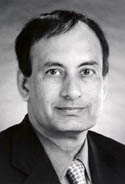On June 30, 2005, Husain Haqqani, Visiting Scholar, Carnegie Endowment for International Peace and Associate Professor of International Relations, Boston University testified before the the U.S. Commission on International Religious Freedom at a hearing on "The United States and Pakistan: Navigating a Complex Relationship."
I would like to begin by thanking the members of the U.S. Commission on International Religious Freedom for the privilege of testifying before you on the situation in Pakistan and U.S. relations with this extremely important country.
Pakistan and the United States have been allies since the 1950s but their relations have been far from tension free. When it emerged as an independent state in 1947, Pakistan was considered a moderate Muslim nation that could serve as a model for other emerging independent Muslim states. Pakistan’s founder, Muhammad Ali Jinnah, was a Shia Muslim. Its first law minister was a Hindu. Its foreign minister belonged to the Ahmadiyya religious community. Although Pakistan’s birth was accompanied by religious riots and communal violence, the country’s founders clearly intended to create a non-sectarian state that would protect religious freedoms and provide the Muslims of South Asia an opportunity to live in a country where the constituted a majority. Continued >>
Click on the link to the right for the full text of this testimony.



.png)
.jpg)
